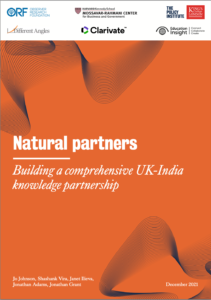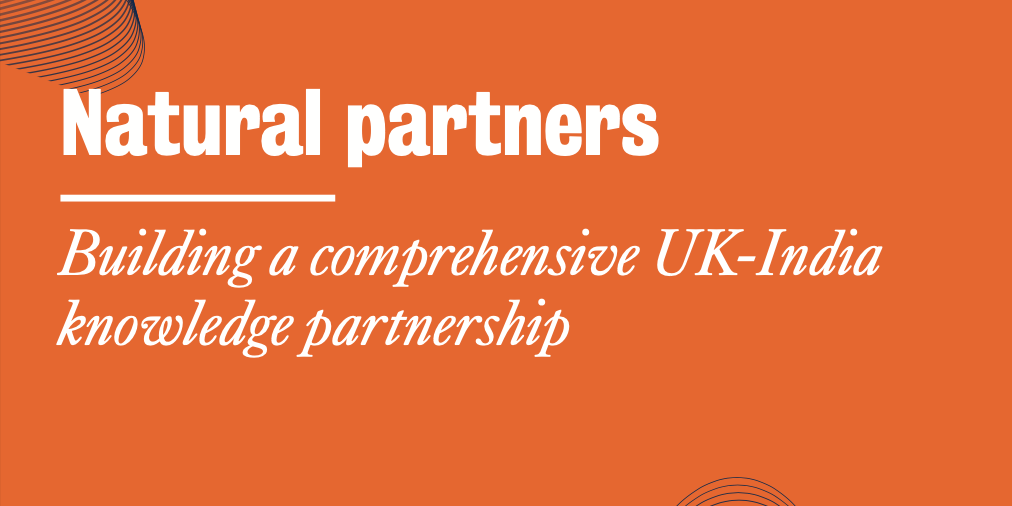 Natural partners: Building a comprehensive UK-India knowledge partnership
Natural partners: Building a comprehensive UK-India knowledge partnership
Jo Johnson, Shashank Vira, Janet Ilieva, Jonathan Adams, Jonathan Grant
The Policy Institute, King’s College London & Harvard Kennedy School (9th December 2021)
- Rt Hon Jo Johnson is a Senior Fellow at the Harvard Kennedy School, and President’s Professorial Fellow at King’s College London.
- Shashank Vira is a Founding Partner of the Hearth Advisors.
- Janet Ilieva is Founder and Director of Education Insight.
- Jonathan Adams is a Visiting Professor at the Policy Institute, King’s College London, and Chief Scientist at the Institute for Scientific Information at Clarivate.
- Jonathan Grant is Founding Director, Different Angles.
Forge comprehensive knowledge partnership with India to reduce dependencies on China, report urges
The partnership should be a primary goal of a proposed free trade agreement
The UK government should make a comprehensive knowledge partnership with India one of the main goals of a proposed free trade agreement between the two countries, according to a new study led by Jo Johnson for Harvard Kennedy School and the Policy Institute at King’s College London.
“The UK needs to deploy its knowledge assets – notably its universities and its research base – in a more strategic way with India, by making a ‘comprehensive knowledge partnership’ the centrepiece of a post-Brexit UK-India free trade agreement,” Mr Johnson, a former universities minister, said.
The report proposes a number of reforms to bolster the competitiveness and long-term sustainability of the UK’s position in international education, with the aim of reducing dependencies on China and driving out fraud and abuse that threatens the integrity of the visa system.
It says the UK should aim to double the number of Indian students studying at UK universities over the life of this parliament, to 100,000 by 2024/25. In 2019/20 there were 139,000 Chinese students hosted by UK institutions – the most of any foreign country and two a half times the 53,000 from India who studied in Britain.
The study urges the government to tackle fraud in international recruitment by deploying cutting-edge document verification tools and by taking steps to stop rogue agents lending and recycling funds on a short-term basis to assist multiple students in bypassing financial tests for visa approval.
“UK Visas and Immigration should adopt a similar approach to Canada’s Student Direct Scheme, which provides a fast visa processing time to students who can prove they have purchased from a recognised bank a Guaranteed Investment Certificate of CAN$10,000,” Mr Johnson said.
The study argues there are a number of potential flashpoints with China, and that a deterioration in diplomatic relations – with knock-on effects for international education, open science and internationally collaborative research – is a real possibility. A structural breakdown in the UK’s relations with India, the world’s largest democracy, is, by contrast, “almost inconceivable”, the report says.
While India is currently overshadowed by China as a force in the global knowledge economy, it is the one country whose demographics and economic potential could enable it to become a knowledge partner for the UK of equivalent importance.
India is home to the world’s largest youthful population under the age of 25, representing over 600 million people. This “demographic dividend” has the potential to be the country’s main source of economic growth over coming decades, but whether it fulfils that potential depends in large part on raising educational attainment.
A comprehensive knowledge partnership that forms the centrepiece of a free trade agreement with India is in line with the UK’s need to develop new strategic partnerships that embody the idea of “Global Britain” and highlight the advantages of leaving the European Union.
Published by the Policy Institute at King’s College London and Harvard Kennedy School, the report proposes five building blocks for the partnership:
- An ambitious goal for the doubling of student numbers from India over the life of this parliament, supported by moving India to the low-risk country list, monitoring of the need for further liberalisation of the post-study work visa and measures to protect the integrity of the visa system.
- Signature of a UK-India mutual recognition of credits and qualifications treaty that enables students to move seamlessly between institutions in the two countries.
- Launch of an authorised and sector-backed loan funding programme for Indian students that both widens access to UK higher education and reduces risk of fraud and predatory lending.
- Steps to ensure the UK’s Turing Scheme supports a more balanced partnership in international education with India, with more UK students studying at Indian institutions.
- Provision of significantly increased funding and support for collaborative R&D that promotes frontier science.







